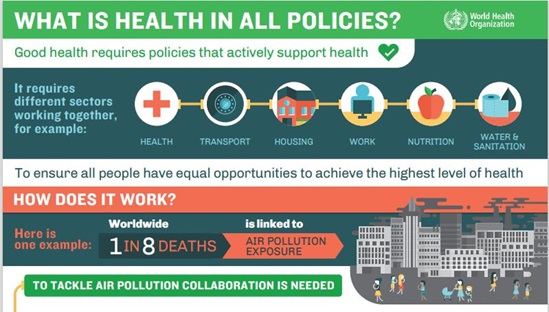Promoting Health in All Policies and intersectoral action capacities
Health in All Policies (HiAP) recognizes that population health is not merely a product of health sector programmes but largely determined by policies that guide actions beyond the health sector. Policy in every sector of government can potentially affect health and inequities in health. Using a HiAP approach aims to address policies such as those influencing transport, housing and urban planning, the environment, education, agriculture, finance, taxation and economic development so that they promote overall health and health equity.
HiAP is about integrated governance which promotes health and equity objectives and at the same time achieves mutual benefits for partnering sectors.
WHO supports countries to implement HiAP and intersectoral action to address the social determinants of health equity by engaging in several different actions, including:
- Making training resources and tools available and offering capacity building opportunities;
- coordination support to a network of trainers and adaptations of training materials to different focuses (e.g. health, environment, housing);
- setting standards for transforming education for health workforce towards social determinants of health;
- promoting links with other WHO governance and programme tools through improved intersectoral planning for health and health equity;
- supporting government policy-makers, programme leaders and health provider groups to improve intersectoral action and coherence in policies, services and programmes responding to disadvantaged groups’ needs; and
- providing advice through the Global Network for HiAP




